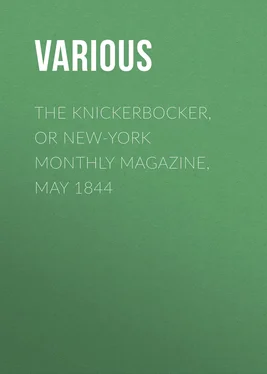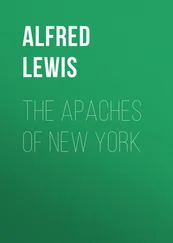Various - The Knickerbocker, or New-York Monthly Magazine, May 1844
Здесь есть возможность читать онлайн «Various - The Knickerbocker, or New-York Monthly Magazine, May 1844» — ознакомительный отрывок электронной книги совершенно бесплатно, а после прочтения отрывка купить полную версию. В некоторых случаях можно слушать аудио, скачать через торрент в формате fb2 и присутствует краткое содержание. Жанр: foreign_antique, periodic, foreign_edu, на английском языке. Описание произведения, (предисловие) а так же отзывы посетителей доступны на портале библиотеки ЛибКат.
- Название:The Knickerbocker, or New-York Monthly Magazine, May 1844
- Автор:
- Жанр:
- Год:неизвестен
- ISBN:нет данных
- Рейтинг книги:4 / 5. Голосов: 1
-
Избранное:Добавить в избранное
- Отзывы:
-
Ваша оценка:
- 80
- 1
- 2
- 3
- 4
- 5
The Knickerbocker, or New-York Monthly Magazine, May 1844: краткое содержание, описание и аннотация
Предлагаем к чтению аннотацию, описание, краткое содержание или предисловие (зависит от того, что написал сам автор книги «The Knickerbocker, or New-York Monthly Magazine, May 1844»). Если вы не нашли необходимую информацию о книге — напишите в комментариях, мы постараемся отыскать её.
The Knickerbocker, or New-York Monthly Magazine, May 1844 — читать онлайн ознакомительный отрывок
Ниже представлен текст книги, разбитый по страницам. Система сохранения места последней прочитанной страницы, позволяет с удобством читать онлайн бесплатно книгу «The Knickerbocker, or New-York Monthly Magazine, May 1844», без необходимости каждый раз заново искать на чём Вы остановились. Поставьте закладку, и сможете в любой момент перейти на страницу, на которой закончили чтение.
Интервал:
Закладка:
‘‘Fear not,’ replied the stranger, ‘I am an angel from heaven, sent to reveal unto thee the fate of thy country. Behold the sins of Roderick have come up before God, and his anger is kindled against him, and he has given him up to be invaded and destroyed. Hasten then to Spain, and seek the camp of thy countrymen. Warn them that such only shall be saved as shall abandon Roderick; but those who adhere to him shall share his punishment, and shall fall under the sword of the invader.’’
The pilgrim ceased, and passed forth from the tent; certain of the cavaliers followed him to detain him, that they might converse further with him about these matters, but he was no where to be found. The sentinel before the tent said, ‘I saw no one come forth, but it was as if a blast of wind passed by me, and there was a rustling as of dry leaves.’
The cavaliers remained looking upon each other with astonishment. The Bishop Oppas sat with his eyes fixed upon the ground, and shadowed by his overhanging brow. At length, breaking silence, in a low and faltering voice, ‘Doubtless,’ said he, ‘this message is from God; and since he has taken compassion upon us, and given us notice of his impending judgment, it behooves us to hold grave council, and determine how best we may accomplish his will and avert his displeasure.’
The chiefs still remained silent, as men confounded. Among them was a veteran noble named Pelistes. He had distinguished himself in the African wars, fighting side by side with Count Julian, but the latter had never dared to tamper with his faith, for he knew his stern integrity. Pelistes had brought with him to the camp his only son, who had never drawn a sword except in tourney. When the young man saw that the veterans held their peace, the blood mantled in his cheek, and, overcoming his modesty, he broke forth with a generous warmth: ‘I know not, cavaliers,’ said he, ‘what is passing in your minds, but I believe this pilgrim to be an envoy from the devil; for none else could have given such dastard and perfidious counsel. For my own part, I stand ready to defend my king, my country, and my faith. I know no higher duty than this, and if God thinks fit to strike me dead in the performance of it, his sovereign will be done!’
When the young man had risen to speak, his father had fixed his eyes upon him with a grave and stern demeanor, leaning upon a two-handed sword. As soon as the youth had finished, Pelistes embraced him with a father’s fondness. ‘Thou hast spoken well, my son,’ said he; ‘if I held my peace at the counsel of this losel pilgrim, it was but to hear thy opinion, and to learn whether thou wert worthy of thy lineage and of the training I had given thee. Hadst thou counselled otherwise than thou hast done, hadst thou shown thyself craven and disloyal, so help me God, I would have struck off thy head with this weapon which I hold in my hand. But thou hast counselled like a loyal and a Christian knight, and I thank God for having given me a son worthy to perpetuate the honors of my line. As to this pilgrim, be he saint or be he devil, I care not; this much I promise, that if I am to die in defence of my country and my king, my life shall be a costly purchase to the foe. Let each man make the same resolve, and I trust we shall yet prove the pilgrim a lying prophet.’ The words of Pelistes roused the spirits of many of the cavaliers; others, however, remained full of anxious foreboding, and when this fearful prophecy was rumored about the camp, as it presently was by the emissaries of the bishop, it spread awe and dismay among the soldiery.
On the following day, the two armies remained regarding each other with wary but menacing aspect. About noontide, King Roderick sent forth a chosen force of five hundred horse and two hundred foot, the best armed of his host, to skirmish with the enemy, that, by gaining some partial advantage, they might raise the spirits of the army. They were led on by Theodomir, the same Gothic noble who had signalised himself by first opposing the invasion of the Moslems.
The Christian squadrons paraded with flying pennons in the valley which lay between the armies. The Arabs were not slow in answering their defiance. A large body of horsemen sallied forth to the encounter, together with three hundred of the followers of Count Julian. There was hot skirmishing about the field, and on the banks of the river; many gallant feats were displayed on either side, and many valiant warriors were slain. As the night closed in, the trumpets from either camp summoned the troops to retire from the combat. In this day’s action the Christians suffered greatly in the loss of their distinguished cavaliers; for it is the noblest spirits who venture most, and lay themselves open to danger; and the Moslem soldiers had instructions to single out the leaders of the adverse host. All this is said to have been devised by the perfidious Bishop Oppas, who had secret communications with the enemy, while he influenced the councils of the king; and who trusted that by this skirmishing warfare the power of the Christian troops would be cut off, and the rest disheartened.
On the following morning, a larger force was ordered out to skirmish, and such of the soldiery as were unarmed were commanded to stand ready to seize the horses and strip off the armor of the killed and wounded. Among the most illustrious of the warriors who fought that day was Pelistes, the Gothic noble who had sternly checked the tongue of the Bishop Oppas. He led to the field a large body of his own vassals and retainers, and of cavaliers trained up in his house, who had followed him to the wars in Africa, and who looked up to him more as a father than a chieftain. Beside him was his only son, who now for the first time was fleshing his sword in battle. The conflict that day was more general and bloody than the day preceding; the slaughter of the Christian warriors was immense, from their lack of defensive armour; and as nothing could prevent the flower of the Gothic chivalry from spurring to the combat, the field was strewed with the bodies of the youthful nobles. None suffered more, however, than the warriors of Pelistes. Their leader himself was bold and hardy, and prone to expose himself to danger; but years and experience had moderated his early fire; his son, however, was eager to distinguish himself in this, his first essay, and rushed with impetuous ardor into the hottest of the battle. In vain his father called to caution him; he was ever in the advance, and seemed unconscious of the perils that surrounded him. The cavaliers and vassals of his father followed him with devoted zeal, and many of them paid for their loyalty with their lives. When the trumpet sounded in the evening for retreat, the troops of Pelistes were the last to reach the camp. They came slowly and mournfully, and much decreased in number. Their veteran commander was seated on his war-horse, but the blood trickled from the greaves of his armour. His valiant son was borne on the shields of his vassals; when they laid him on the earth near to where the king was standing, they found that the heroic youth had expired of his wounds. The cavaliers surrounded the body and gave utterance to their grief; but the father restrained his agony, and looked on with the stern resignation of a soldier.
Don Roderick surveyed the field of battle with a rueful eye, for it was covered with the mangled bodies of his most illustrious warriors; he saw, too, with anxiety, that the common people, unused to war, and unsustained by discipline, were harassed by incessant toils and dangers, and were cooling in their zeal and courage.
The crafty Bishop Oppas marked the internal trouble of the king, and thought a favorable moment had arrived to sway him to his purpose. He called to his mind the various portents and prophecies which had forerun their present danger. ‘Let not my lord the king,’ said he, ‘make light of these mysterious revelations, which appear to be so disastrously fulfilling. The hand of Heaven appears to be against us. Destruction is impending over our heads. Our troops are rude and unskilful, but slightly armed, and much cast down in spirit. Better is it that we should make a treaty with the enemy, and, by granting part of his demands, prevent the utter ruin of our country. If such counsel be acceptable to my lord the king, I stand ready to depart upon an embassy to the Moslem camp.’
Читать дальшеИнтервал:
Закладка:
Похожие книги на «The Knickerbocker, or New-York Monthly Magazine, May 1844»
Представляем Вашему вниманию похожие книги на «The Knickerbocker, or New-York Monthly Magazine, May 1844» списком для выбора. Мы отобрали схожую по названию и смыслу литературу в надежде предоставить читателям больше вариантов отыскать новые, интересные, ещё непрочитанные произведения.
Обсуждение, отзывы о книге «The Knickerbocker, or New-York Monthly Magazine, May 1844» и просто собственные мнения читателей. Оставьте ваши комментарии, напишите, что Вы думаете о произведении, его смысле или главных героях. Укажите что конкретно понравилось, а что нет, и почему Вы так считаете.












